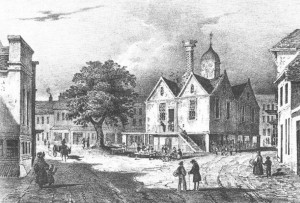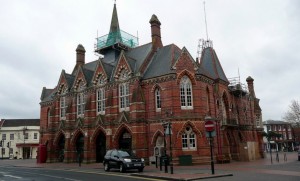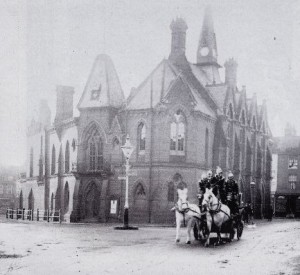Wokingham’s Town Hall was completed in 1860; the scale of its structure dominates the surrounding shops and offices. The history books tell us it was opened by Richard Cornwallis Neville, the 4th Lord Baybrooke. It all sounds rather dry, but Lord Baybrooke and others bring the event to life with a lesson in speech making. He was only 40 when he opened the Town Hall and died just a year later in 1861. This article is from the Berkshire Chronicle.
The opening of the new Town Hall – 6th June 1860.
The Berkshire Chronicle (reported 9th June 1860) ‘Wednesday was quite a gala day at Wokingham, the handsome and ornamental new Town-Hall, which is quite an important feature in the town, being formally opened on that day by the High Steward of the town, Richard Cornwallis Neville, 4th Lord Braybrooke.
The old building had become so dilapidated that it was felt indispensable to erect a new hall, in which to conduct the public business of Wokingham. The idea was taken up with much spirit by the leading inhabitants of the town, and the gentry of the neighbourhood gave a liberal support to the undertaking. Combined with the building is the station for the Wokingham division of the County Constabulary, and in consideration of the advantages to be derived from this connection the fund also received material aid from the county. Before recording the events of the opening ceremony we will state briefly the general features of the building.
The walls are built of black, red and white brick, harmoniously arranged, and with considerable effect; the patterns of black bricks in the cornices and arches are of an elegant design. A degree of prominence is given to the Town Hall by an increased decoration in the windows and archways. The roofs are covered by green slates. Considerable variety in the outline is caused by the ornamental towers over the entrances at each end of the hall, and the clock turret rising from the centre of the hall roof. The most striking feature of the of the external part of the building is the admirable workmanship of the brickwork, and the taste displayed in the arrangement of the various ornamental details, which reflects the highest credit on the contractors, who have so successfully carried out the intentions of the architects.
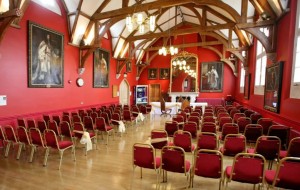
Interior of Wokingham Town Council’s Great Hall. Photo from Wokingham Town Council (Have a virtual wander)
The chief feature of interest internally is the hall—a room 45 feet in length, and 25 feet broad. The council chamber at the south end can be opened to the hall by sliding doors, under a pointed archway. The framework of the roof is visible inside the hall, and is ornamental, 8 with spandrels and curved timbers, stained and varnished. Considerable effect is given to the ceiling (which is arranged in panels) by coloured fretwork. Pendant gasaliers from the roof light the hall by night. The interesting and valuable portraits from the old hall are suspended against the walls, and the Recorder has presented the corporation with a handsome looking-glass, which has been placed over one of the chimney pieces. The furniture of the council chamber has been designed by the architects and admirably executed by Mr. Parsons of Wokingham.
The buildings comprise the Town Hall, with the usual offices: savings bank, mechanics institution, large covered market under the hall, a county police station, with prisoners’ cells, and accommodation for the superintendent and constables and fire engine station.
The cost of the works has been between £3,000 and £4,000. Messrs Poulton and Woodman, of Reading, were the architects, and Messrs Wheeler (masons), and Mr. Woodroffe (carpenter), the contractors. The pictures have been admirably restored, and framed by Mr. Butler, of Reading.
As we have previously stated, Wednesday last (6th) was fixed for the opening of the new building, and the town presented a very gay and lively appearance. The High Steward, attired in military uniform, arrived by rail at about a quarter to one o’clock, and was received by the Alderman, J. L. Roberts, Esq., the members of the Corporation, and a large number of the inhabitants of the town, the band playing the National Anthem, and the bells of the old church ringing out a merry peal.
A carriage was in waiting to receive his lordship, and accompanied by the Recorder, F. A. Carrington, Esq., he proceeded therein to the Alderman’s residence, followed by the band, which played a number of popular airs. Then came the emblem of civic authority—the mace—which was borne before the members of the Corporation, and a large number of the principal inhabitants of the town formed the rear of the procession. The streets were thronged with spectators, and extending from the hall down Broad Street, a row of school children was formed on either side. The union-jack floated from the roof of the hall, and the windows of the neighbouring houses were filled with spectators.
After a short stay at the Alderman’s house, Lord Braybrooke re-entered the carriage which proceeded to the Town Hall followed by the procession in the same order as on coming from the station. Having alighted, his lordship entered the building and proceeded upstairs to the hall. This had been enlarged for the occasion by throwing back the doors and so giving the additional room to be occupied by the corporation as a Council Chamber. At the end a raised dais had been erected, and after cordially recognising some of the ladies present, his Lordship took his seat in the centre chair, with the recorder on his right, and the Alderman on the left.
The hall was crowded with a very fashionable audience, there being a great many ladies present, who appeared to take considerable interest in the proceedings. The platform was filled and surrounded by a large number of the most influential country residents, the members of the corporation, and other inhabitants of the town. Among those present we observed the High Sheriff of the county (Sir C. S. P. Hunter, Bart.), Sir E. Conroy, Bart., Sir E. Hulse, Bart., the Rev. Sir J. W. Hayes, Bart., Archdeacon Randall, The Rev. T. Morres (Corporation Chaplain), Captain L. Gower, R. Gibson, Esq., T.C. Garth, Esq., J. Walter, Esq., M.P. Charlton Esq., G. Barker, Esq., R. Palmer, Esq., E. Kinnersley, Esq., Major Court, W. C. King, Esq., J. Simonds, Esq., (Sindlesham), the Rev. A. A. Cameron, R. Garrard, Esq., Colonel Fraser, Rev. H. Roberts, Rev. E. W Benson, Rev. E. Parker (Waltham St. Lawrence) &c., &c.
The proceedings were opened by the reading of an appropriate prayer, by the Rev. T. Morres, invoking the Divine blessing on the building, on the magistracy who would have to dispense justice within its walls, and that it might be made a means for the moral and intellectual improvement of the inhabitants, while for all the greater gift of the knowledge of Christ was implored.
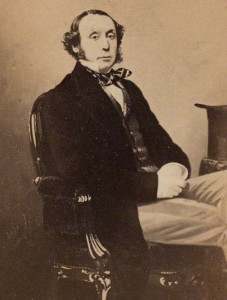
A well known British archaeologist, Richard Cornwallis Neville, the 4th Lord Baybrooke was only 40 when opening the Town Hall and died just a year later in 1861.
Speeches
The High Steward Richard Cornwallis Neville, 4th Lord Braybrooke (ed: who owned the nearby Billingbear estate) then rose and said, “Ladies and gentlemen: it gives me very great pleasure to be able attend myself personally to discharge one of the duties of my hereditary office as High Steward of this ancient municipal corporation. I congratulate you on the day being finer than I could have hoped for at first, for it threatened on every side to have been a pouring wet day. I feel very much flattered by the welcome reception of so many ladies coming out to shed good omen on the opening of this hall. There are so many faces whom I ought to know from the associations of my earliest youth, when passed at Billingbear, in the days of my respected grandfather, that I feel quite at a loss to be able to put proper names to everybody’s faces. But I recollect a great many of them, and I feel very highly honoured by their presence here—gentlemen as well as ladies (applause).
The office I hold is, as you are aware, an hereditary one, and it has been so since the days of King James the First. I have inherited it from many of my ancestors, who dwelt in this part of the country; and whatever unwillingness or modesty I may have in comparing myself with any of the good qualities of my ancestors, yet there is one quality in which I will I will not admit my inferiority, and that is in memory, which is equally hereditary with property and this office.
My memory carries me back to many days of my earliest youth, in which I remember many events which took place in my grandfather’s time. Mr. Roberts was telling me the other day that he could recollect when in my grandfather’s time, as long ago as 1798, there was a review on the terrace at Billingbear in the presence of George III., of some militia regiment. I cannot go back quite so far, but I remember that at the end of October 1824, I was on the terrace, and saw a review there of quite a different kind, although the troops were there, and in red coats. It was in the days of that respected baronet, Sir John Cope, then the gallant master of the hunt—(applause)—when I saw seven foxes paraded from the Warren copse to the other copse in my grandfather’s presence (loud laughter).
If I were to mention all that I could recollect of the days of my earliest youth I should detain you a very long time, but I must now come to the point, which is to say that today this hall is opened (applause). It is a very great improvement on the ancient hall, for however picturesque the former Town Hall may have been this one is, I suppose, well adapted for the purpose, and comprises many different departments within its walls. I think it cannot fail to be opened under favourable auspices, with such a goodly company present, with the bright sun shining upon the scene; and besides these—all the Berkshire roses have come out too (applause). I may only add that I myself have two very young buds with a maternal blossom (laughter and applause). I regret they are not present themselves. They have never been in Berkshire, but still, as being my wife and children, they are connected with Berkshire, and I have no doubt you would welcome them equally if they came, as I hope some day they will, to pay a visit to this town—(loud applause). I feel much obliged to all of you for all you have done for me in honouring me with your presence this day (loud applause).”
Recorder Mr F. A. Carrington said it was with pleasure and pride that he appeared in this hall for the first time as Recorder, and that he should be the first Recorder to appear in it. His connection with the town did not go back to the time of the old hall, although he knew that building, and certainly it was a very useful building to the Corporation and town for a good while. But like many good things it had worn out, and the steps that led up and down to the council chamber were so worn that he thought the first time he went down them, he should have went down head, foremost but luckily he was caught in time, and the accident did not happen (laughter).
The town of Wokingham had been an inhabited place for a great many centuries. The first mention he knew of the town was in the charter of Offa, King of the Mercians in 726, wherein he granted to his prefect—whether that was the alderman of Wokingham in those days he could not ascertain, because it was a Latin term, but probably it was the same—some rights appertaining to the church situate in the territory of the Wokings, which appeared to be a district inhabited by a Saxon tribe extending from Woking on the one side to Wokingham on the other.
The place seemed to have taken the same name, because as late as Queen Elizabeth’s charter, the town was called Wokingham, and as Wokingham was not a town, most probably this was the place mentioned previously. So far they traced the history of the town very far back, and in that state it seemed to have continued until the reign of Queen Elizabeth, and then there was an alderman under that name. Queen Elizabeth confirmed various privileges to the town which had existed from time immemorial—one of which was that her steward of the manor of Sonning was to administer the affairs of the town conjointly with the alderman. So things remained until the reign of James the First, when the town took a start very much in the right direction.
Through the influence at the court of James of an ancestor of their present High Steward—the then Lord Braybrooke, the present government charter was obtained. Then they had the Corporation exactly as they are now, with certainly as good as staff for the administration of the affairs of a town as could well be obtained. There was the Lord High Steward, and his duties were not defined by the charter, but it was easy to ascertain what they were. He was the medium of communication between the court at Windsor castle, the government and the town. These were duties not easily defined by charter but very well understood by persons acquainted with politics, either of that period or the present.
The next officer King James gave them was the Recorder, who he hoped was and had been of great use in the administration of justice, both civil and criminal, because he held sessions for the transaction of criminal business and also a local court for the adjudication in civil causes, not exceeding £50, so that if they required it, they could obtain a settlement of such cases there, and with the sessions they had not got many prisoners for trial at the assizes or elsewhere.
In addition Sir H. Neville gave them a local magistracy, which rendered it unnecessary for them to go to other places, and also granted the privilege of holding a market and three fairs in the course of the year—which at one time were great marts for the transaction of business, but now in consequence of railway facilities they were not so much used. For these they were indebted to Sir H. Neville, and his influence with King James.
He found also that the corporation of Wokingham were jolly people—(laughter)—for within the last twelve month a list of healths to be drank at the corporation dinner had been found, written on a piece of parchment, and they were much the same as are given at corporation dinners now, but there is one very peculiar feature in them. There are eight toasts in succession, and the ninth and tenth, or the two bottom ones, are the Royal Family and the Prince of Wales, and above them is put the Recorder. Now although he has heard and read that a living dog was better than a dead lion, yet they found here that a present “nobody and snob” was considered much better than absent royalty (laughter). But this did not turn out exactly to be so, because it would be seen, on reference to the list, that the royal toasts were put at a considerable distance from the others, as a supplementary addition or addendum and the humble suggestion he would give of the meaning was that, supposing the alderman was going to be very liberal with his wine, then he was to take these two toasts, and put them in their proper place, but if he was “scaly” or sparing of it, then they were to be omitted. But assuming as he did that a great deal of strong beer was drank at corporation dinners, if every gentlemen had ten glasses of wine in addition put under his belt, the chances are that he would feel very comfortable (laughter). That was a specimen of the corporation of those days. They had not degenerated since (laughter), for he was happy to say from experience that the corporation dinners now were very good, and the hospitality excellent (laughter and applause).
Leaving James’ reign, he would observe with reference to the old hall, that he had been enabled to discover the date of the building within twelve years. In 1612, James the First gave the corporation the liberty and authority to build a hall, and in 1625, the corporation made a code of bye-laws, in which it was directed that all the corporation meetings were to be held in the Town Hall, and that every member of the corporation who did not attend in his black gown was to be fined 3s. 4d. for neglect. That was a fine he thought was never levied, for he believed they all came in their gowns, and looked very well, as he knew from experience (laughter and applause).
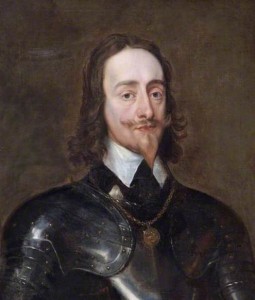
One on the paintings which can be seen in Wokingham Town Hall. View more here.
Later still they had a benefactor in the shape of a donor of pictures and there were some very beautiful paintings around the hall. There was some difficulty in ascertaining what many of them were, and greater difficulty to know by whom they were given. He should have ascribed them to Prince George of Denmark, the husband of Queen Anne, because he had taken the title of baron from their town; but the greatest evidence against this supposition was, that there was no portrait in the hall of Prince George. There were portraits of two of the Georges—George the First and George the Second—and that would lead them to suppose that some monarch gave the pictures, and if it were so, it would most probably be George the Second. But from all the information he was able to obtain, he could not discover who was the actual donor. Here, however, the pictures were in excellent condition and a great ornament to the Town Hall (applause). He believed he had now stated the most prominent features in the history of the town except one—viz., that they formerly had a mint or coinage there.
In the reign of Charles the Second a great many tradesmen in town used tokens. He had one which had been given him by Mr. Prince, grocer, of Reading, and bearing the name of William Anderson. This he had shown to many persons in the town acquainted with its former history, but no one knew such a person as William Anderson, and thought it must have been coined somewhere else. However, from the researches of the clergyman in the parish register, it was found that William Anderson died in 1691, he being a person of great consideration, and from the inscription on the token it was also seen that he was an eminent grocer—so that beyond the other incidents he had enumerated, he had also given them credit for having a mint (applause).
The old hall stood well for 250 years. He hoped the career of the present building would not be so brief, because he had been in many halls of double the antiquity, and in quite good condition as when first erected. He thanked them for the attention they had given him, and congratulated them on having so handsome a building not only for municipal, but all other purposes (loud applause).
Alderman J. L. Roberts, said as the suggestion of rebuilding their town hall originated with himself, as he had taken great interest in the progress of the work, they would allow him to offer them a few words of congratulation on its final completion (hear hear and applause).
It was not to be supposed that they could have parted with their picturesque old building, which as the recorder had told them, was worn out, without a sigh (hear hear). But when they found out it was so worn out, and that it was impossible to make it adequate to the growing wants and interests of the town, then he thought that they should feel themselves highly benefited by the change effected (cheers). Some persons had raised an objection as to their having united with the county in the erection of this building; but when they considered that in the first place it afforded material aid to the funds—in the second place that it ensured the concentration of all the public business in the centre of the town (hear hear), and lastly, that it gave them the protection of the police—and as a magistrate of the town he might here observe that he could vouch for their most efficient and judicious care (hear hear)—then looking at these considerations it must be seen that the benefits accruing to them far outweigh the objection raised to that respect (hear hear); and looking at the advantages they had gained, they might dispense with all regret and objection (applause).
But there was one other objection to their proceeding with this building, and that was their funds, both public and private, being limited to a very narrow compass, they were therefore obliged to ask their neighbours to assist them in the undertaking. And it gave him very great pleasure to see present, not only his lordship, but so many other of the neighbouring gentlemen to had so kindly responded to their call, and he begged to express to them on the part of himself and the members of the corporation the deep sense they entertained of their kindness and liberality (loud applause).
He could only hope that they, as well as the magistrates of the town would find that hall adequate in all respects for the administration of justice; and he would also hope that the neighbouring gentry would continue to aid them in their endeavours to make that building conducive not only to the material prosperity of the town, but also to the moral and intellectual advancement of its inhabitants (loud and continued applause).
The High Sheriff, (Sir C. S. P Hunter, Bart.), then declared that the opening ceremony was concluded, and accompanied by the Recorder and Alderman and other gentlemen, proceeded to inspect the hall and other compartments of the building.
A large party then adjourned to the Alderman’s house, where an elegant luncheon was provided; while the Grand Jury and others also sat down to luncheon at the Rose.
Although the morning was gloomy and threatening, yet the sun shone out brightly, and the weather was all that could be desired during the ceremony’.
Thanks as ever to Jim Bell for transcribing the article from the Berkshire Chronicle. The link on the story of the Town Hall’s paintings was written by Trevor Ottlewski for the BBC.

